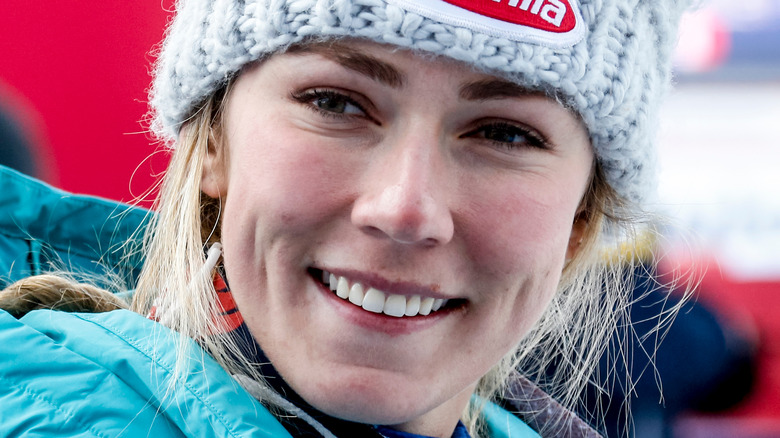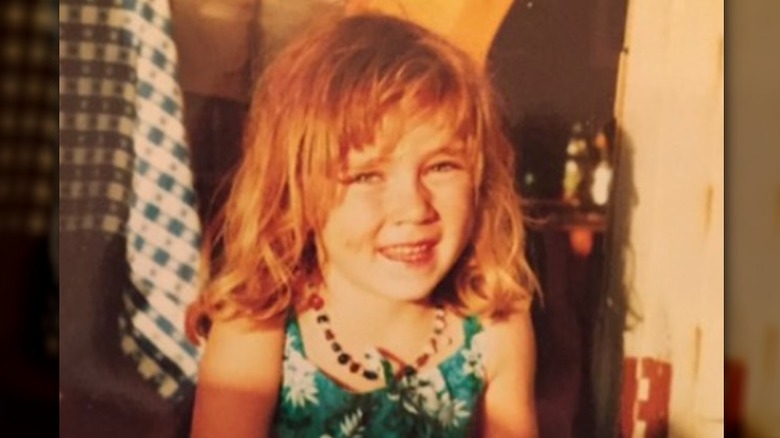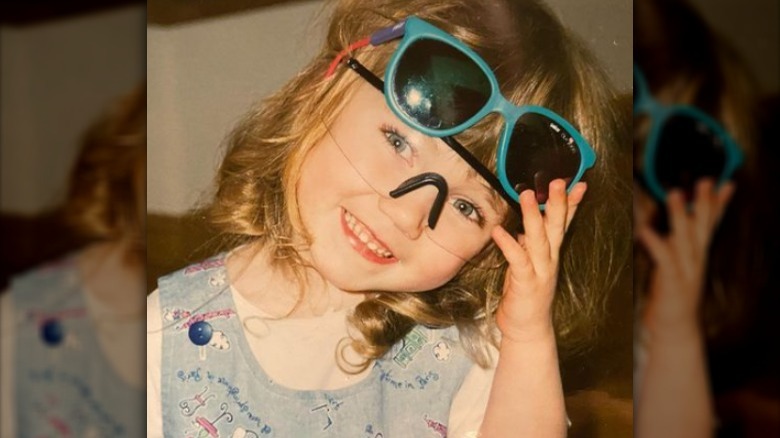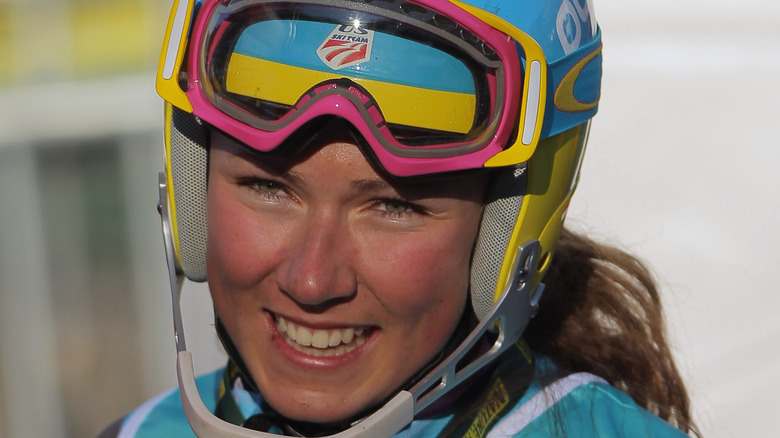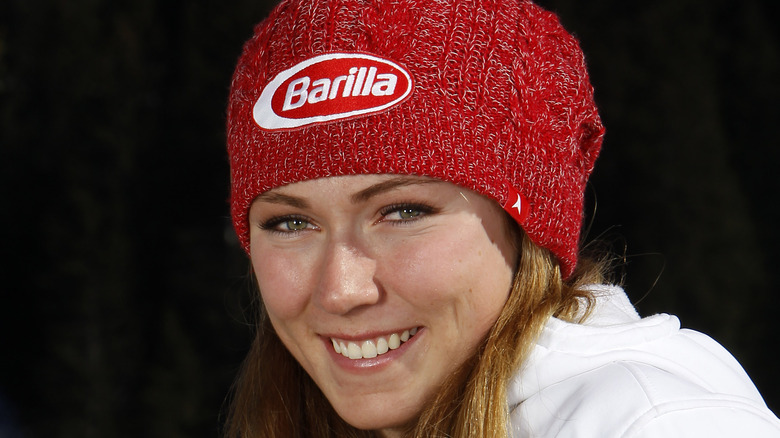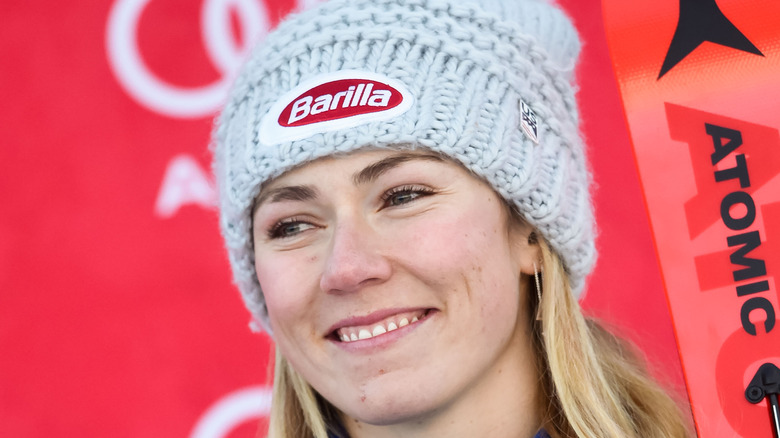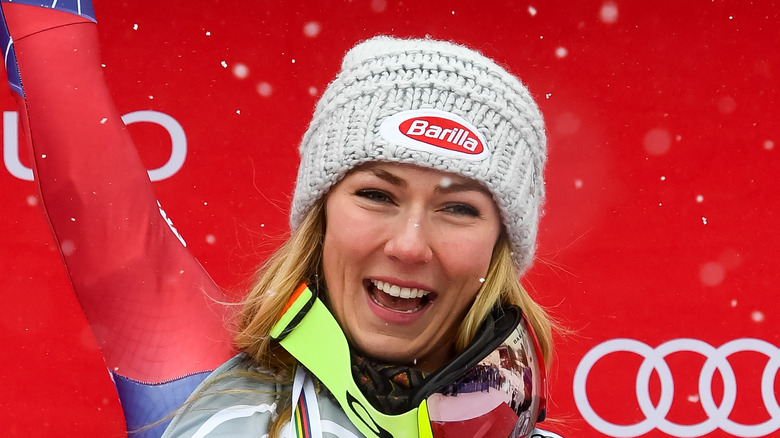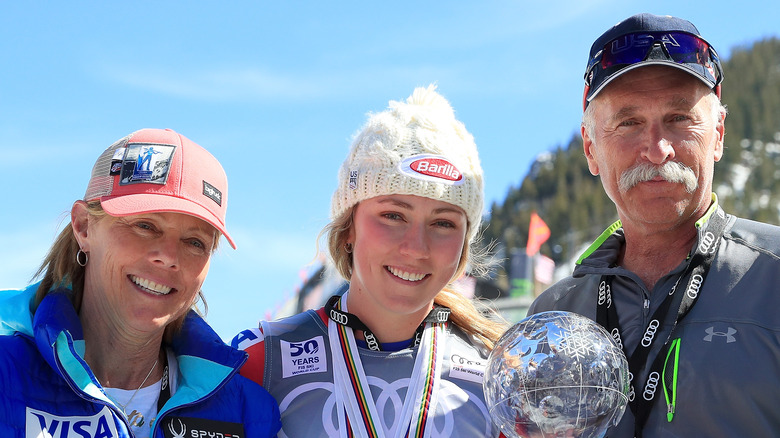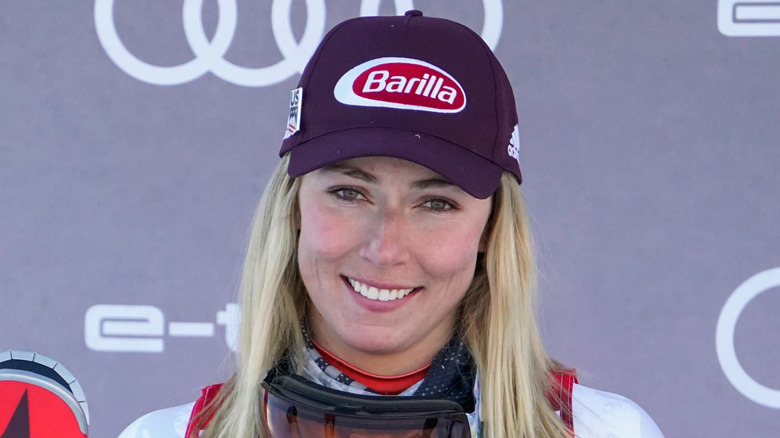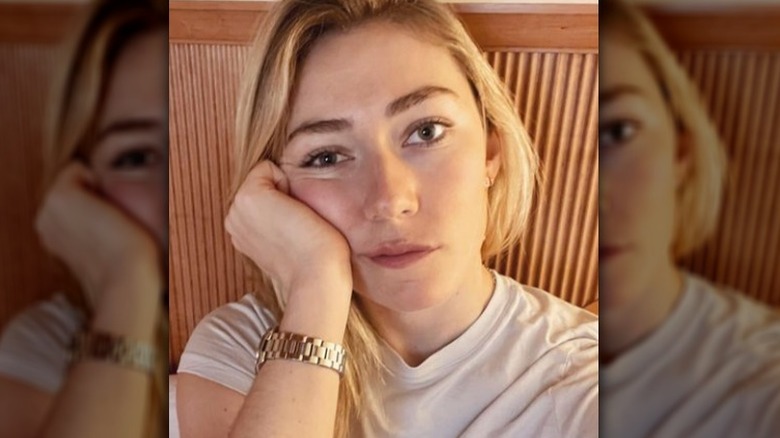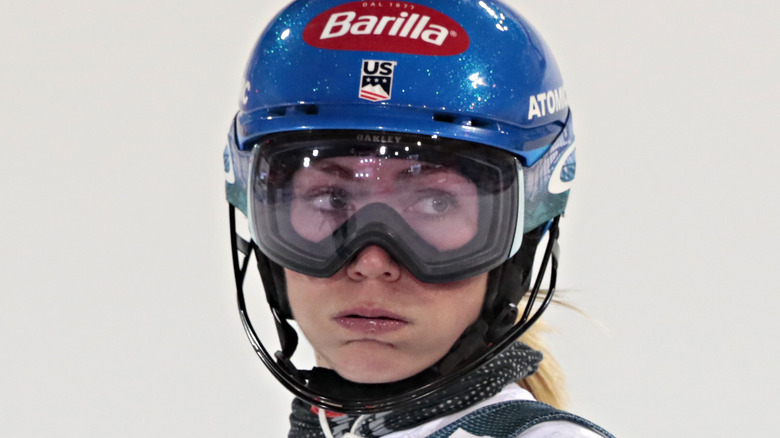The Stunning Transformation Of U.S. Olympian Mikaela Shiffrin
Mikaela Shiffrin has been wowing skiing enthusiasts and seasoned professionals since she first strapped on a pair of skis, and she has been enthralling fans around the world since she made her World Cup debut. After winning gold medals in both the 2014 and 2018 Olympic Games, all eyes are on Shiffrin as she heads into the 2022 Olympics in Beijing as a heavy favorite for the events.
Like many people, Shiffrin has experienced a lot of challenges. But unlike a lot of us, she's had to shoulder those challenges, including the unexpected loss of her beloved father and her own COVID-19 diagnosis, while preparing to return to the world's biggest sporting event. At this point, Shiffrin is a formidable opponent to just about anyone across several events, including slalom, giant slalom, super-G, and downhill skiing.
Here is a peek at the life of a young skier who has captured the interest and attention of millions around the world.
Mikaela Shiffrin joined her first ski club at the age of 8
Mikaela Shiffrin was only 8 years old when she joined her first ski club in New Hampshire. As the mother of a fellow youth skier later wrote for Yankee Magazine, it was immediately clear that Shiffrin was in the sport to go as far as she possibly could. Meg Noonan wrote in 2019 that when Shiffrin joined her daughter's club, she was volunteering as the program's co-director. While a lot of the kids were talented, it was hard to take your eyes off Shiffrin.
As Noonan noted, Shiffrin was at the club to learn and to compete. She explained, "When other kids were sliding on cafeteria trays on a slope near the base lodge, she was rehearsing pole plants. When other kids were chomping through boxes of pre-race Milk Duds, she was calmly preparing to eat their lunch on the slalom or giant slalom course."
Noonan wasn't the only one who saw her potential. As former coach Mark Schiffman put it, Shiffrin was the "most polished" kid in the bunch. In fact, he said, "Her skiing was so smooth, it was not immediately obvious how much faster she was than other kids." Soon, however, there was no way for anyone at the club to ignore Shiffrin's skiing prowess.
She was coached by her mom, Eileen
Mikaela Shiffrin stood out in more ways than one as a young skater. As Meg Noonan wrote in Yankee Magazine, when many skiers her age seemed impossibly frustrated or embarrassed by the presence of their parents out on the slopes, Mikaela thrived under the watchful eye of her mother, Eileen Shiffrin, who also served as her coach.
Mike Holland, a coach at the club that young Mikaela attended, noticed the same thing. As he explained to Noonan, "Instead of getting fed up and turned off, Mikaela listened and did what her mother asked her to do." Holland noted that typically kids don't respond well to over-excited parents who tell them when, where, and how to ski, but Mikaela did.
Both Eileen and Mikaela's father, Jeff, were skiers, too. As reported by Sports Illustrated, the pair were part of the masters ski circuit following their marriage, which meant they skied alongside others who are over 30 years old. The two eschewed ski lessons for their young children (Mikaela has a brother named Taylor) and instead taught the two themselves, with Jeff telling the publication, "Both of us, and Eileen in particular, weren't prepared to turn our kids' development over to somebody else, particularly if that somebody else has eight or 10 kids they're responsible for. If you have 35 kids in a school classroom, it's hard to get anything but mediocrity."
Mikaela Shiffrin made her World Cup debut at the age of 15
That kind of intense one-on-one coaching paid off in a big way for Mikaela Shiffrin, as she made her debut at the World Cup when she was only 15 years old and ultimately became the youngest skier ever to win a U.S. National Championship in the sport (per MN2S). Her first major event took place in Špindlerův Mlýn, Czech Republic. As Ski Magazine reported at the time, Shiffrin was thrilled to be out there. She told the magazine, "It's like a dream really coming true here. I can't explain it, but it's something close to amazing. I'm just excited to be here."
Shiffrin also had a great time out in the field because she had the opportunity to meet Lindsey Vonn, a skier whom she admired tremendously. While Shiffrin missed placing in the top 30 for the slalom, the experience of being out at the World Cup was more than enough for her.
She became the youngest person to win gold in slalom at the Sochi Games
Mikaela Shiffrin was 18 years old when she traveled to the Sochi Olympics in 2014. Shiffrin was enormously successful and ended up winning the gold medal in the slalom event, making her the youngest winner of Olympic gold in the event ever.
Many were impressed by Shiffrin's ability to correct herself while in mid-air during the event. As described by ESPN, an early mistake meant that even Shiffrin believed she had blown her shot at the top prize. As she told the publication, while skiing the slalom she was only hoping to win a medal, period. She said, "There I was, I'm like, 'Grrreat. I'm just going to go win my first medal.' And then in the middle of the run, I'm like, 'Guess not.'" But she turned things around by reminding herself not to give up, and she ended up going all the way.
In addition to being the youngest person to win the gold, Shiffrin was also the first American woman to win a medal in the event since the 1972 Sapporo Olympics.
Mikaela Shiffrin was riddled by anxiety in the years that followed
However, all that Olympic success didn't meant that Mikaela Shiffrin had an easy time of skiing or life in general in the years that followed the 2014 Olympic Games. As she told the New Yorker in 2017 ahead of the 2018 games, in earlier years, she had possessed nerves of steel. Unfortunately, those days had passed. Shiffrin explained, "I never used to feel nervous. Just excited. But this past season I got so nervous I had to throw up a couple of times."
In the interview, Shiffrin revealed that she began battling ski-related anxiety when the International Ski Federation World Cup came to the Eastern United States, where her family is originally from. Over 30,000 people showed up, many of them hoping to watch Shiffrin. The audience even included her 95-year-old grandmother, and Shiffrin explained that she began to feel a pressure that just hadn't existed before.
Shiffrin began working with a sport psychologist and soon realized that she was experiencing something many athletes go through once being thrust onto a world stage: All of a sudden, she was hyper-aware of how she answered questions posed by reporters. She told the New Yorker that the sessions served her well, explaining, "It was a reminder that sometimes it's better to be oblivious, but I'm not oblivious anymore, so how do I handle that?"
Mikaela Shiffrin earned her second gold medal in 2018
Happily, by the time the 2018 Olympic Games in Pyeongchang rolled around, Mikaela Shiffrin was back in top form and ready to conquer her anxiety once and for all. She repeated her gold medal win in slalom, but not before she set out on righting her mind and focusing on the sport she loves.
Shiffrin told Sports Illustrated that she began to lose control of her feelings, saying, "I started to worry about disappointing people. My team, the media. My feelings were scattered all over the place." At the 2018 Games themselves, Shiffrin had to sit tight as her events were delayed by bad weather over and over again, a situation that could make anyone susceptible to worrying too much.
When it was time to perform, Shiffrin was ready. She easily took home the gold medal in her first event, giant slalom. She explained that the medal was especially gratifying, as the event doesn't come quite as easily to her as slalom does. Shiffrin told Sports Illustrated, "Giant slalom is something I have a love-hate relationship with. It's more difficult for me to find a good rhythm in GS, so I need to train it a lot, I need to be in a good mood, I need to be aggressive."
Her father's unexpected death set her back several months in 2020
Like a lot of people, Mikaela Shiffrin had a hard time throughout 2020. In addition to the ongoing health crisis that continues to plague much of the world, she lost one of the most important people in the world to her: her father, Jeff Shiffrin. Jeff's death was sudden and unexpected, caused by an injury to his head, and left the young athlete unsure if she would ever pick up a pair of skis again.
While visiting the "Today" show, Shiffrin explained that she really wasn't sure she would ski anymore because she had completely lost the ability to be concerned about the sport at all. She said, "I wondered if it was really worth it. There was a really long time that I didn't really feel like it was worth it to care about anything ... the most fundamental thing of an athlete is that you have to care about your sport and you have to care about doing well at your sport, and I just didn't."
Eventually, Shiffrin came back to the sport that she had been practicing since she was 3 years old, often with both of her parents alongside her. In fact, she came back with a bit of a vengeance, telling the show's hosts that her new goal was to compete in six events at the 2022 Olympic Games.
In November 2021, Mikaela Shiffrin faced off against a skiing rival
By November 2021, Mikaela Shiffrin was back in her skis and ready to continue to dominate the sport. As noted by The New York Times, up to that point, Shiffrin had never really had a consistent rival who continued to push her to be better and vice-versa, until Slovakia's Petra Vlhova entered the picture. Vlhova was also besting Shiffrin in many events, winning two of the first three races the pair faced off in.
But when the World Cup event returned to the United States, Shiffrin readjusted her crown and showed the world she still has plenty of fight left in her. After winning by 75-hundredths of a second, Shiffrin told the publication, "I feel more like myself; I don't know that I can ski slalom faster than that."
Shiffrin also responded positively to the rivalry with Vlhova, admitting that even her friends and family are interested in watching the drama unfold and that knowing Vlhova is there pushes her to succeed. Shiffrin also said that when both women are performing at their best, "there's not a whole lot I can do that's better than what she's doing."
Mikaela Shiffrin was diagnosed with COVID in December 2021
In December 2021, a mere two months before the start of the 2022 Olympic Games, Mikaela Shiffrin was diagnosed with COVID-19. The diagnosis forced the skier to drop out of the World Cup slalom and giant slalom events in Austria at the end of the month. She wasn't the only skier sitting out the event, but she was a little nervous about how catching the virus could impact her ability to become the World Cup champion once more.
As USA Today explained, though Shiffrin was ahead of Italian skier Sofia Goggia by 115 points ahead of the World Cup event in Austria, racing the slalom and giant slalom were crucial to keeping that lead overall. Fortunately, Shiffrin was able to bounce back from her COVID-19 diagnosis fairly quickly, and ended up earning the second place spot at the 2022 alpine skiing World Cup event in Zagreb, Croatia (per NBC Sports).
She's a favorite for the 2022 Olympic Games
With the 2022 Olympic Games beginning on February 4, 2022, Mikaela Shiffrin is entering the arena as a favorite for the slalom and giant slalom events. As the Australian Broadcasting Corporation has noted, Shiffrin is also entering with the reputation as one of the greatest alpine skiers of all time, which means she's likely carrying a bit of weight and pressure to succeed on her shoulders.
As Shiffrin herself told the Associated Press (via the Olympics website), skiing and competing at the elite level is constantly a challenge. While explaining that she relates to the kind of pressure that fellow Olympian Simone Biles admitted to experiencing, she said skiing is always scary. "You can't really control the outcome beyond your own skiing. And that's a really uncomfortable place to be." On top of that, Shiffrin is well aware of the expectations from those she loves the most, as well as what her fans are hoping to see from her.
At this point, Shiffrin also said that her philosophy toward skiing really comes down to one truth: "You just race, I guess."
